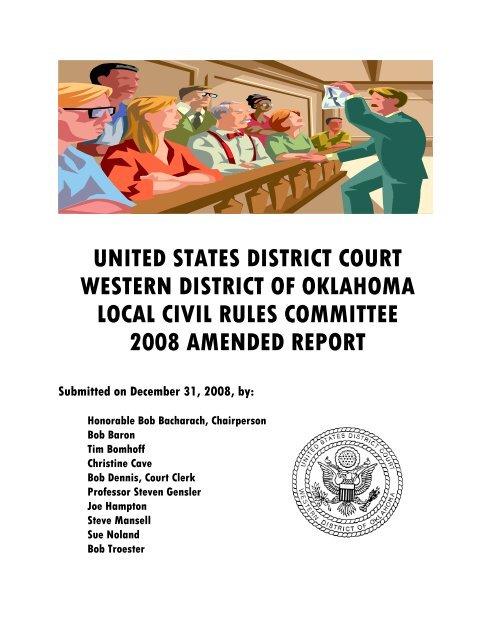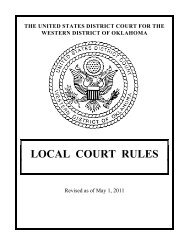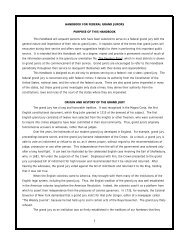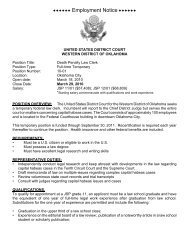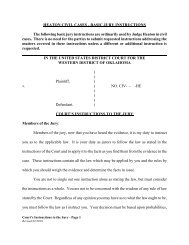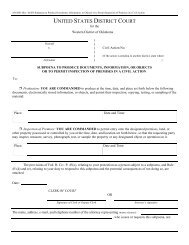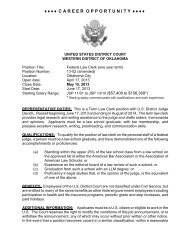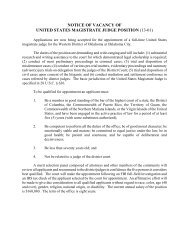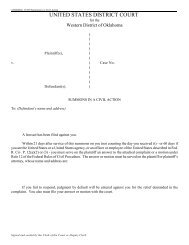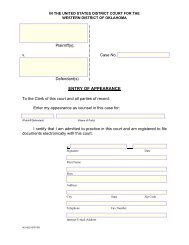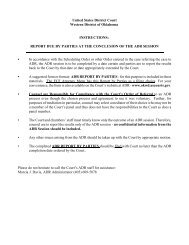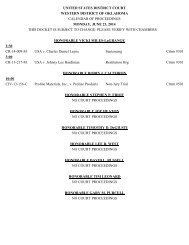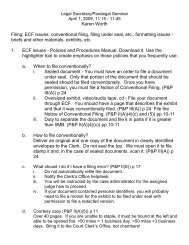united states district court western district of oklahoma local civil ...
united states district court western district of oklahoma local civil ...
united states district court western district of oklahoma local civil ...
Create successful ePaper yourself
Turn your PDF publications into a flip-book with our unique Google optimized e-Paper software.
UNITED STATES DISTRICT COURT<br />
WESTERN DISTRICT OF OKLAHOMA<br />
LOCAL CIVIL RULES COMMITTEE<br />
2008 AMENDED REPORT<br />
Submitted on December 31, 2008, by:<br />
Honorable Bob Bacharach, Chairperson<br />
Bob Baron<br />
Tim Bomh<strong>of</strong>f<br />
Christine Cave<br />
Bob Dennis, Court Clerk<br />
Pr<strong>of</strong>essor Steven Gensler<br />
Joe Hampton<br />
Steve Mansell<br />
Sue Noland<br />
Bob Troester
Table <strong>of</strong> Contents<br />
1. LCvR 5.2(a)<br />
A. The Proposed Change .........................................1<br />
B. Reason for the Change.........................................1<br />
2. LCvR 7.1(d)<br />
A. The Proposed Change .........................................1<br />
B. Reason for the Change.........................................1<br />
3. LCvR 16.1(a)(1)<br />
A. The Proposed Change .........................................2<br />
B. Reason for the Change.........................................3<br />
4. LCvR 16.1(b)(2)<br />
A. The Proposed Change .........................................4<br />
B. Reason for the Change.........................................4<br />
5. LCvR 16.1(c)<br />
A. The Proposed Change .........................................4<br />
B. Reason for the Change.........................................5<br />
6. LCvR 16.2<br />
A. The Proposed Change .........................................5<br />
B. Reason for the Change.........................................5<br />
7. LCvR 16.3<br />
A. The Proposed Change .........................................6<br />
i
B. Reason for the Change.........................................8<br />
8. LCvR 55.1<br />
A. The Proposed Change ........................................22<br />
B. Reason for the Change........................................22<br />
9. LCvR 83.6(c)<br />
A. The Proposed Change ........................................25<br />
B. Reason for the Change........................................26<br />
10. Appendix II - Joint Status Report and Discovery Plan<br />
A. The Proposed Change ........................................27<br />
B. Reason for the Change........................................33<br />
11. Appendix III - Scheduling Order<br />
A. The Proposed Change ........................................34<br />
B. Reason for the Change........................................38<br />
12. Appendix IV - Final Pretrial Report<br />
A. The Proposed Change ........................................38<br />
B. Reason for the Change........................................42<br />
ii
Proposed Amendments (2008)<br />
1. LCvR 5.2(a)<br />
A. The Proposed Change<br />
All papers presented to the Clerk for filing by electronic means or in paper<br />
form shall be double-spaced, if typewritten, using only one side <strong>of</strong> the paper<br />
and a paper size <strong>of</strong> 8 ½ inches wide and 11 inches long. All papers shall be<br />
clearly legible. All pleadings, motions, and briefs shall be formatted in<br />
accordance with LCvR 7.1(c), (d) & (e).<br />
B. Reason for the Change<br />
2. LCvR 7.1(d)<br />
Formatting requirements can be found in multiple places in the Local Civil<br />
Rules, such as Rule 5.2(a) and Rule 7.1(c), (d) and (e). As a result, attorneys<br />
can easily believe that they are in compliance because they have conformed<br />
with the formatting requirements <strong>of</strong> the rule, while overlooking the other rule<br />
governing formatting. In 2006, the Committee considered consolidation <strong>of</strong> the<br />
two sections into one, but was concerned that attorneys familiar with the rules<br />
as they existed at that time could be confused by the change. To avoid<br />
unnecessary confusion and help guide attorneys to both provisions dealing<br />
with the form <strong>of</strong> papers presented for filing, the Committee proposes that each<br />
rule cross-reference the other.<br />
A. The Proposed Change<br />
(d)<br />
Font Size and Margins. For all pleadings, motions, and briefs the print<br />
style, including footnotes, shall not be less than 13-point type, and<br />
margins shall be a minimum <strong>of</strong> one inch on the top, bottom, and sides.<br />
Additionally, these documents shall comply with the format<br />
requirements in LCvR 5.2.<br />
B. Reason for the Change<br />
Formatting requirements can be found in multiple places in the Local Civil<br />
Rules, such as Rule 5.2(a) and Rule 7.1(c), (d) and (e). As a result, attorneys<br />
can easily believe that they are in compliance because they have conformed<br />
with the formatting requirements <strong>of</strong> the rule, while overlooking the other rule<br />
governing formatting. This confusion is exacerbated by the fact that Federal
3. LCvR 16.1(a)(1)<br />
Rule <strong>of</strong> Civil Procedure 5 addresses filing, but does not address formatting<br />
except to say that the Court Clerk cannot decline to file papers based on form<br />
defects. Federal Rule <strong>of</strong> Civil Procedure 7 does discuss the form <strong>of</strong> motions<br />
and other papers. Therefore, a practitioner could reasonably assume that the<br />
formatting requirements in the <strong>local</strong> <strong>civil</strong> rules are found solely in Rule 7.1.<br />
In 2006, the Committee considered consolidation <strong>of</strong> the two sections into one,<br />
but was concerned that attorneys familiar with the rules as they existed at that<br />
time could be confused by the change. To avoid unnecessary confusion and<br />
help guide attorneys to both provisions dealing with the form <strong>of</strong> papers<br />
presented for filing, the Committee proposes that the <strong>local</strong> rules crossreference<br />
one another.<br />
A. The Proposed Change<br />
(1) Preparation for Status and Scheduling Conferences. Prior to the first<br />
status and scheduling conference, tTrial counsel for all parties, and pro<br />
se parties, if any, shall confer and prepare a Joint Status Report and<br />
Discovery Plan in the form provided as Appendix II. It shall be the<br />
duty <strong>of</strong> counsel for the plaintiff to arrange the joint preparation <strong>of</strong><br />
this document and the duty <strong>of</strong> all counsel and pro se parties to<br />
jointly participate in the preparation. This Joint Status Report and<br />
Discovery Plan will be prepared, signed jointly, and filed as a single<br />
document with the Clerk <strong>of</strong> the Court not later than seven calendar<br />
days prior to the status and scheduling conference, unless otherwise<br />
ordered by the Court.<br />
In connection with the preparation <strong>of</strong> the document:<br />
(a)<br />
(b)<br />
(c)<br />
all counsel shall discuss ADR with their client(s),<br />
all counsel and pro se litigants, if applicable, shall discuss<br />
ADR with one another, and<br />
all counsel and pro se litigants, if applicable, shall indicate<br />
whether the party elects to have the action referred to a<br />
specific procedure, if appropriate.<br />
2
Certification <strong>of</strong> these discussions must be submitted in conjunction<br />
with the Joint Status Report and Discovery Plan in the form<br />
provided as Appendix II.<br />
The Joint Status Report and Discovery Plan shall include, to the extent<br />
then known, the contentions <strong>of</strong> each party and the issues <strong>of</strong> fact and<br />
law. It shall also contain a list <strong>of</strong> all exhibits, witnesses, and discovery<br />
materials to the extent then known, together with time estimates to<br />
complete discovery and trial. It shall be the duty <strong>of</strong> counsel for the<br />
plaintiff or pro se plaintiff to arrange this joint preparation and the duty<br />
<strong>of</strong> all counsel and pro se parties to jointly participate in and facilitate it.<br />
The information exchanged shall be incorporated into the Joint Status<br />
Report and Discovery Plan. This Joint Status Report and Discovery<br />
Plan will be prepared and signed jointly and filed as a single document<br />
with the Clerk <strong>of</strong> Court not later than seven calendar days prior to the<br />
status and scheduling conference, unless otherwise ordered by the<br />
Court.<br />
B. Reason for the Change<br />
In 2007, the Court eliminated legal issues, witness lists, and exhibit lists in the<br />
joint status report and discovery plan. The proposed amendment would<br />
conform the <strong>local</strong> <strong>civil</strong> rule to the existing form.<br />
The language regarding “issues <strong>of</strong> fact” does not match the language on the<br />
form in Appendix II. Thus, the Committee proposes deletion <strong>of</strong> the phrase,<br />
“issues <strong>of</strong> fact,” in LCvR 16.1(a)(1).<br />
The Committee proposes modification <strong>of</strong> LCvR 16.3 to focus the rule on<br />
mediations. With that change, the Committee suggests moving the discussion<br />
<strong>of</strong> ADR in LCvR 16.3(b) to LCvR 16.1(a)(1). This change requires some<br />
stylistic changes in LCvR 16.1(a)(1). For example, references to the<br />
contentions and time estimates would be deleted from the rule. The<br />
Committee believes this language is unnecessary because the form, Appendix<br />
II, already requires submission <strong>of</strong> contentions and time estimates for the trial.<br />
3
4. LCvR 16.1(b)(2)<br />
A. The Proposed Change<br />
(2) The clerk who keeps the minutes <strong>of</strong> the status and scheduling<br />
conference shall have forms available conforming to the form provided<br />
herein as Appendix III, whereby the time and/or date fixed by the Court<br />
for the performance <strong>of</strong> specified duties may be inserted. Upon request,<br />
counsel will be supplied with a copy <strong>of</strong> such form so that they may<br />
make their own notations <strong>of</strong> deadlines and <strong>of</strong> other orders prescribed by<br />
the judge presiding over the conference. Such executed form, when<br />
approved by the Court and filed, shall constitute the order <strong>of</strong> the Court<br />
as to such schedules without the necessity <strong>of</strong> filing any other order to<br />
the same effect. Unless otherwise directed by the assigned judge, the<br />
form and content <strong>of</strong> a jointly prepared, proposed Final Pretrial Report,<br />
conforming to the sample form provided herein as Appendix IV, shall<br />
be filed by plaintiff’s counsel on or before the first day <strong>of</strong> the month<br />
that the case is scheduled for trial. Plaintiff’s counsel shall file with the<br />
Court the jointly prepared Final Pretrial Report along with an extra<br />
copy for the Court and shall be accompanied by and shall submit a<br />
proposed order approving the Report. The executed Final Pretrial<br />
Report, when approved by the Court, shall constitute an order <strong>of</strong> the<br />
Court as to all matters contained therein.<br />
B. Reason for the Change<br />
5. LCvR 16.1(c)<br />
The existing language is not technically accurate.<br />
A. The Proposed Change<br />
(c) Authorization <strong>of</strong> Alternative Dispute Resolution. The Court<br />
authorizes Alternative Dispute Resolution methods, including<br />
mediation, judicial settlement conferences, and summary jury<br />
trials.<br />
4
B. Reason for the Change<br />
6. LCvR 16.2<br />
The suggested language is virtually identical to the existing provision in LCvR<br />
16.3(a). The proposal would involve restructuring <strong>of</strong> LCvR 16.3 to address<br />
private mediation. Express authorization <strong>of</strong> alternative dispute resolution is<br />
necessary under 28 U.S.C. § 651(b).<br />
A. The Proposed Change<br />
(f) Requests for Relief. A request for relief from any aspect <strong>of</strong> this rule<br />
shall be made to the settlement judge in the manner set forth in the settlement<br />
conference order.<br />
(g) Sanctions. Failure to comply with any provision <strong>of</strong> this rule or the<br />
settlement conference order may result in the imposition <strong>of</strong> sanctions.<br />
(f) Confidentiality and Limitations <strong>of</strong> Use <strong>of</strong> Settlement Information.<br />
All communications made in connection with a settlement conference,<br />
other than as stated below, shall be considered confidential. Unless<br />
otherwise permitted under Fed.R.Evid. 408 or any other provision <strong>of</strong><br />
federal law, communications made in connection with a judicial<br />
settlement conference may not be used by any party in the trial <strong>of</strong> the<br />
case. Any motion by counsel or reports by the settlement judge, including<br />
those concerning noncompliance with the <strong>local</strong> rules, shall not violate<br />
confidentiality.<br />
(g) Requests for Relief. A request for relief from any aspect <strong>of</strong> this rule<br />
shall be made to the settlement judge in the manner set forth in the<br />
settlement conference order.<br />
(h) Sanctions. Failure to comply with any provision <strong>of</strong> this rule or the<br />
settlement conference order may result in the imposition <strong>of</strong> sanctions.<br />
B. Reason for the Change<br />
The confidentiality provision currently appears in LCvR 16.3, and the<br />
proposed amendment would add the clause to LCvR 16.2. The proposed<br />
change to LCvR 16.3 would confine that rule to private mediations. The<br />
5
7. LCvR 16.3<br />
provisions involving sanctions and requests for relief in LCvR 16.2 would<br />
simply be renumbered.<br />
A. The Proposed Change<br />
(a)<br />
(b)<br />
Authorization. The Court authorizes Alternative Dispute Resolution (ADR)<br />
methods including mediation, judicial settlement conferences, and summary<br />
jury trials.<br />
Certification <strong>of</strong> ADR Discussions in the Joint Status Report and Discovery<br />
Plan. Prior to the first status and scheduling conference:<br />
(1) all counsel shall discuss ADR with their client(s),<br />
(2) all counsel and pro se litigants, if applicable, shall discuss ADR with<br />
one another, and<br />
(3) all counsel and pro se litigants, if applicable, shall indicate whether the<br />
party elects to have the action referred to a specific procedure, if<br />
appropriate.<br />
Certification <strong>of</strong> these discussions must be submitted in conjunction with the<br />
Joint Status Report and Discovery Plan filed pursuant to LCvR16.1.<br />
(c)<br />
Confidentiality and Limitations <strong>of</strong> Use <strong>of</strong> Settlement Information. All<br />
communications made in connection with a settlement conference shall be<br />
considered confidential. Unless otherwise permitted under Fed.R.Evid. 408<br />
or any other provision <strong>of</strong> federal law, communications made in connection<br />
with ADR may not be used by any party in the trial <strong>of</strong> the case.<br />
Any motion by counsel or reports by a neutral including those concerning noncompliance<br />
with the <strong>local</strong> rules shall not violate confidentiality.<br />
Court-Ordered Mediation<br />
(a)<br />
Selection <strong>of</strong> the Mediator. In a mediation ordered by the Court,<br />
the parties may select any mediator that they agree upon. If the<br />
parties are unable to agree, they may contact the Court’s ADR<br />
Coordinator for assistance in the selection <strong>of</strong> a mediator.<br />
6
(b)<br />
Required Attendance. Unless otherwise directed by the designated<br />
mediator, the following shall attend any mediation ordered by the<br />
Court:<br />
(1) Named Parties. Each named party shall attend the<br />
mediation, regardless <strong>of</strong> the availability <strong>of</strong> insurance. If any<br />
party is not a natural person, a representative <strong>of</strong> that party<br />
with knowledge <strong>of</strong> the relevant facts shall attend the<br />
mediation.<br />
(2) Governmental Body. If approval by a Governmental Body<br />
is required by law to authorize settlement, attendance <strong>of</strong> at<br />
least one current member <strong>of</strong> the Governmental Body is<br />
required. “Governmental Body” as used in this subsection<br />
(b)(2) means a governmental board <strong>of</strong> directors, trustees,<br />
commissioners, managers, or other similar <strong>of</strong>ficers.<br />
(3) Insurers and/or Subrogors. Insurers and/or subrogors <strong>of</strong><br />
any party shall attend the mediation. Counsel for any such<br />
party is responsible for notifying the insurer and/or<br />
subrogor <strong>of</strong> this requirement.<br />
(4) Lead Trial Counsel. Lead trial counsel for each named<br />
party shall attend the mediation.<br />
(c)<br />
Required Settlement Authority. Unless otherwise directed by the<br />
designated mediator, each party must attend a <strong>court</strong>-ordered<br />
mediation with full settlement authority.<br />
(1) Definition <strong>of</strong> “Full Settlement Authority” for the Plaintiff.<br />
For a plaintiff, such representative must have final<br />
settlement authority, in the representative’s discretion, to<br />
authorize dismissal <strong>of</strong> the case with prejudice or to accept a<br />
settlement amount down to the defendant’s last <strong>of</strong>fer.<br />
(2) Definition <strong>of</strong> “Full Settlement Authority” for the Defendant.<br />
For a defendant, the term “full settlement authority”<br />
requires the defendant to have final settlement authority to<br />
commit the party to pay, in the representative’s discretion,<br />
7
an amount up to the plaintiff’s prayer or up to the plaintiff’s<br />
last demand, whichever is lower.<br />
(d)<br />
Mediation Statements. Unless otherwise directed by the designated<br />
mediator in a <strong>court</strong>-ordered mediation:<br />
(1) each party shall submit a mediation statement to the<br />
assigned mediator and serve counsel for all other parties at<br />
least three business days before the mediation, and<br />
(2) the statement shall not exceed five pages double-spaced and<br />
shall set forth the relevant positions <strong>of</strong> the parties<br />
concerning factual issues, legal issues, and relief requested.<br />
(e)<br />
(f)<br />
(g)<br />
Mediator Report. Unless otherwise ordered, the parties shall<br />
ensure the filing <strong>of</strong> the mediator’s report in a <strong>court</strong>-ordered<br />
mediation. The filing shall be on the form approved by the Court<br />
no later than five business days after completion <strong>of</strong> the mediation.<br />
Confidentiality. All communications made in connection with a<br />
<strong>court</strong>-ordered mediation, other than as stated below, shall be<br />
considered confidential. Unless otherwise permitted under Fed. R.<br />
Evid. 408 or any other provision <strong>of</strong> federal law, communications<br />
made in connection with a <strong>court</strong>-ordered mediation may not be<br />
used by any party in the trial <strong>of</strong> the case. Any motion by counsel<br />
or reports by the designated mediator, including those concerning<br />
noncompliance with the <strong>local</strong> rules, shall not violate confidentiality.<br />
Sanctions. In a <strong>court</strong>-ordered mediation, failure to comply with<br />
any provision <strong>of</strong> this Rule may result in the imposition <strong>of</strong> sanctions.<br />
B. Reason for the Change<br />
The proposed amendments resemble the 2003 changes to the <strong>local</strong> <strong>civil</strong> rule<br />
on settlement conferences (LCvR 16.2). For mediations that are ordered by<br />
the Court, the amendments would:<br />
! add a definition <strong>of</strong> “full settlement authority,”<br />
! authorize waiver <strong>of</strong> certain requirements by the mediator, and<br />
! require the filing <strong>of</strong> a mediator’s report.<br />
8
These amendments are prompted by the Committee’s survey <strong>of</strong> practitioners<br />
and mediators in February 2008. Over 70% <strong>of</strong> the respondents favored a <strong>local</strong><br />
<strong>civil</strong> rule on mediations. Among these attorneys, over 80% supported the<br />
inclusion <strong>of</strong> rules on attendance and settlement authority. Among the<br />
individuals who have served as mediators within one year, support for rules on<br />
these two subjects was even greater.<br />
At the same time, the Committee recognizes that some practitioners may prefer<br />
to utilize a mediation by agreement, without oversight by the Court or<br />
application <strong>of</strong> <strong>local</strong> <strong>civil</strong> rules. Thus, the new <strong>local</strong> <strong>civil</strong> rule would govern<br />
only when a mediation is ordered by the Court.<br />
The proposed rule would add a provision in LCvR 16.3(a) to create flexibility<br />
in the approach when the parties are unable to agree on a mediator. Some<br />
judges may prefer the ADR coordinator to submit a list <strong>of</strong> mediators and direct<br />
the attorneys to “strike” individuals until they are left with only one. Other<br />
judges may prefer the parties to address the issue through a formal motion.<br />
The proposed rule would create flexibility and allow individual judges to<br />
address the issue however they wish.<br />
9
LOCAL CIVIL RULES SURVEY REPORT<br />
JUNE 2008<br />
In February 2008, the Local Civil Rules Committee distributed a short survey on <strong>local</strong><br />
rules addressing mediation. The survey went to all attorneys in the CM/ECF system and asked<br />
the following four questions:<br />
(1) During the past 12 months, have you:<br />
a. participated in mediations as counsel for a party and/or<br />
b. served as a mediator<br />
(2) Are you in favor <strong>of</strong> having a <strong>local</strong> rule that applies to mediations<br />
(3) If you favor a <strong>local</strong> rule addressing mediation, indicate all areas/topics you feel<br />
the provision should address:<br />
a. Required attendees<br />
b. Required settlement authority<br />
c. Requests to be excused from attendance or settlement authority requirements<br />
d. Communication with mediator<br />
e. Other topics.<br />
(4) During the past 2 years, have you participated in any <strong>of</strong> the following ADR<br />
proceedings<br />
a. Early neutral evaluation<br />
b. Court-annexed non-binding arbitration<br />
c. Summary jury trial<br />
d. Summary bench trial<br />
e. Executive mini trial<br />
f. Special master proceeding.<br />
The Committee received 362 responses. The responses have been tabulated and analyzed<br />
for five different populations <strong>of</strong> survey respondents:<br />
(1) All survey respondents;<br />
(2) The respondents who indicated that they had participated in mediation during the<br />
past 12 months (i.e., the respondents who answered “yes” to Question 1a);<br />
10
(3) The respondents who indicated that they had served as a mediator during the past<br />
12 months (i.e., the respondents who answered “yes” to Question 1b);<br />
(4) The respondents identified by the Committee as experienced mediation<br />
participants; and<br />
(5) The respondents identified by the Committee as experienced mediators.<br />
Summary <strong>of</strong> Results<br />
A substantial majority <strong>of</strong> the survey respondents favor <strong>local</strong> rules addressing mediation.<br />
Overall, 72.9% <strong>of</strong> respondents favor <strong>local</strong> rules on this subject. When the question is posed to<br />
the subset populations, that percentage held within 1% for all but the last group. Only 2 out <strong>of</strong> 7<br />
experienced mediators favor <strong>local</strong> mediation rules, though the very small sample size makes that<br />
result hard to extrapolate.<br />
A substantial majority <strong>of</strong> those who favor <strong>local</strong> rules support each <strong>of</strong> the specific <strong>local</strong><br />
rules topics identified in Question 3. Support was highest for <strong>local</strong> mediation rules covering<br />
required attendance (87.7%) and required settlement authority (84.5%). Support levels remained<br />
generally constant across the subset populations.<br />
Out <strong>of</strong> 362 respondents, 51 favor <strong>local</strong> mediation rules topics not specified in Question 3.<br />
The respondents who had served as mediators (including experienced mediators) were the most<br />
likely to favor additional topics. Confidentiality and cost were the most frequently mentioned<br />
topics. A full list <strong>of</strong> the additional topics suggested is attached as Appendix A.<br />
Question 4 listed six forms <strong>of</strong> non-mediation ADR proceedings and asked whether the<br />
respondents had participated in any <strong>of</strong> those proceedings during the past two years. The<br />
participation rate for each <strong>of</strong> those proceedings – individually – was small. The most common<br />
were early neutral evaluation (7.7%) and <strong>court</strong>-annexed nonbinding arbitration (6.4%). In the<br />
aggregate, however, 94 out <strong>of</strong> 364 respondents (26%) reported participating in at least one nonmediation<br />
ADR proceeding during the past two years.<br />
11
Analysis <strong>of</strong> Results Received from All Survey Participants<br />
Table 1<br />
All Survey Participants<br />
N=362<br />
Question 1: “During the past 12 months, have you . . .”<br />
Number <strong>of</strong><br />
Participants<br />
Percentage <strong>of</strong> All<br />
Survey Participants<br />
a. Participated in Mediation in past 12 months 277 76.5%<br />
b. Served as a mediator in the past 12 months 36 9.9%<br />
Question 2*: “Are you in favor <strong>of</strong> having a <strong>local</strong> rule that applies<br />
to mediations”<br />
Number <strong>of</strong><br />
Participants<br />
Percentage <strong>of</strong> All Survey<br />
Participants<br />
a. Yes 264 72.9%<br />
b. No 94 26%*<br />
Question 3: “If you favor a <strong>local</strong> rule addressing mediation,<br />
indicate all areas/topics you feel the provision should address.”<br />
Number <strong>of</strong><br />
Participants<br />
(out <strong>of</strong> 264)<br />
Percentage<br />
<strong>of</strong><br />
Participants<br />
Who Favor<br />
Rules**<br />
Percentage<br />
<strong>of</strong> All<br />
Survey<br />
Participants<br />
a. Required attendees 243 87.7% 67.1%<br />
b. Required settlement authority 234 84.5% 64.6%<br />
c. Requests to be excused from attendance or settlement authority 206 74.4% 56.9%<br />
requirements<br />
d. Communication with mediators 186 67.1% 51.4%<br />
e. OTHER topics (see Appendix A for specific suggestions) 51 18.4% 14.1%<br />
Question 4: “During the past 2 years, have you participated in any<br />
<strong>of</strong> the following ADR proceedings”<br />
Number <strong>of</strong><br />
Participants<br />
(out <strong>of</strong> 362)<br />
Percentage <strong>of</strong> All Survey<br />
Participants<br />
a. Early neutral evaluation 28 7.7%<br />
b. Court-annexed non-binding arbitration 23 6.4%<br />
c. Summary jury trial 11 3%<br />
d. Summary bench trial 12 3.3%<br />
e. Executive mini trial 5 1.4%<br />
f. Special master proceeding 15 4.1%<br />
*4 participants declined to answer question number 2.<br />
**Those who responded that they favor rules applying to mediation in question 2.<br />
12
Analysis <strong>of</strong> Responses Received From Persons Who Participated<br />
in Mediation in the Past 12 Months<br />
Table 2<br />
All Mediation Participants<br />
N=277<br />
Question 2: “Are you in favor <strong>of</strong> having a <strong>local</strong> rule that applies to<br />
mediations”<br />
Number <strong>of</strong><br />
Participants*<br />
Percentage**<br />
a. Yes 203 73.3%<br />
b. No 70 25.3%<br />
Question 3: “If you favor a <strong>local</strong> rule addressing mediations,<br />
indicate all areas/topics you feel the provision should address.”<br />
Number <strong>of</strong><br />
Participants<br />
(out <strong>of</strong> 203)<br />
Percentage<br />
<strong>of</strong><br />
Mediation<br />
Participants<br />
Who Favor<br />
Rules***<br />
Percentage<br />
<strong>of</strong> All<br />
Mediation<br />
Participants<br />
a. Required attendees 191 94.1% 69%<br />
b. Required settlement authority 182 89.7% 65.7%<br />
c. Requests to be excused from attendance or settlement authority 158 77.8% 57%<br />
requirements<br />
d. Communication with mediators 138 68% 49.8%<br />
e. OTHER topics 37 18.2% 13.4%<br />
Question 4: “During the past 2 years, have you participated in any<br />
<strong>of</strong> the following ADR proceedings”<br />
Number <strong>of</strong><br />
Participants<br />
(out <strong>of</strong> 277)<br />
Percentage**<br />
a. Early neutral evaluation 21 7.6%<br />
b. Court-annexed non-binding arbitration 20 7.2%<br />
c. Summary jury trial 10 3.6%<br />
d. Summary bench trial 10 3.6%<br />
e. Executive mini trial 4 1.4%<br />
f. Special master proceeding 12 4.3%<br />
*4 participants declined to answer question number 2.<br />
**Based on the total number <strong>of</strong> participants in this analysis (n=277).<br />
***Those who responded that they favor rules applying to mediation in question 2.<br />
13
Analysis <strong>of</strong> Responses Received From Persons Who<br />
Served as a Mediator in the Past 12 Months<br />
Table 3<br />
All Mediators<br />
N=36<br />
Question 2: “Are you in favor <strong>of</strong> having a <strong>local</strong> rule that<br />
applies to mediators”<br />
Number <strong>of</strong><br />
Participants<br />
Percentage<br />
a. Yes 26 72.2%<br />
b. No 10 27.8%<br />
Question 3: “If you favor a <strong>local</strong> rule addressing mediation,<br />
indicate all areas/topics you feel the provision should<br />
address.”<br />
Number <strong>of</strong><br />
Participants<br />
(out <strong>of</strong> 26)<br />
Percentage <strong>of</strong><br />
Mediators Who<br />
Favor Rules**<br />
Percentage<br />
<strong>of</strong> All<br />
Mediator<br />
Participants*<br />
a. Required attendees 25 96.2% 69.4%<br />
b. Required settlement authority 23 88.5% 63.9%<br />
c. Requests to be excused from attendance<br />
20 80% 55.6%<br />
or settlement authority requirements<br />
d. Communication with mediators 15 60% 41.7%<br />
e. OTHER topics 8 32% 22.2%<br />
Question 4: “During the past two years, have you<br />
participated in any <strong>of</strong> the following ADR proceedings”<br />
Number <strong>of</strong><br />
Participants<br />
Percentage<br />
a. Early neutral evaluation 4 11.1%<br />
b. Court-annexed non-binding arbitration 2 5.6%<br />
c. Summary jury trial 1 2.8%<br />
d. Summary bench trial 3 8.3%<br />
e. Executive mini trial 1 2.8%<br />
f. Special master proceeding 3 8.3%<br />
*Based on the total number <strong>of</strong> participants in this analysis (n=36).<br />
**Those who responded that they favor rules applying to mediation in question 2.<br />
14
Analysis <strong>of</strong> Responses Received From Persons the Committee Identified as Being<br />
Experienced Mediation Participants<br />
Table 4<br />
Experienced Mediation Participants<br />
N=103<br />
Question 2: “Are you in favor <strong>of</strong> having a <strong>local</strong> rule that applies to<br />
mediations”<br />
Number <strong>of</strong><br />
Participants<br />
Percentage*<br />
a. Yes 75 72.8%<br />
b. No 26 25.2%<br />
Question 3: “If you favor a <strong>local</strong> rule addressing mediation, indicate<br />
all areas/topics you feel the provision should address.”<br />
Number <strong>of</strong><br />
Participants<br />
(out <strong>of</strong> 75)<br />
Percentage<br />
<strong>of</strong><br />
Experienced<br />
Mediation<br />
Participants<br />
Who Favor<br />
Rules**<br />
Percentage<br />
<strong>of</strong> All<br />
Experienced<br />
Mediation<br />
Participants*<br />
a. Required attendees 67 89.3% 65%<br />
b. Required settlement authority 67 89.3% 65%<br />
c. Requests to be excused from attendance or settlement authority 59 78.7% 57.3%<br />
requirements<br />
d. Communication with mediators 51 68% 49.5%<br />
e. OTHER topics 17 22.7% 16.5%<br />
Question 4: “During the past two years, have you participated in any<br />
<strong>of</strong> the following ADR proceedings”<br />
Number <strong>of</strong><br />
Participants<br />
Percentage*<br />
a. Early neutral evaluation 12 11.8%<br />
b. Court-annexed non-binding arbitration 7 6.9%<br />
c. Summary jury trial 7 6.9%<br />
d. Summary bench trial 3 2.9%<br />
e. Executive mini trial 0 0%<br />
f. Special master proceeding 0 0%<br />
*Based on the total number <strong>of</strong> participants in this analysis (n=103).<br />
**Those who responded that they favor rules applying to mediation in question 2.<br />
15
Analysis <strong>of</strong> Responses Received From Persons the Committee Identified as Being<br />
Experienced Mediators<br />
Table 5<br />
Experienced Mediators<br />
N=8<br />
Question 2: “Are you in favor <strong>of</strong> having a <strong>local</strong> rule that applies to<br />
mediations”<br />
Number <strong>of</strong><br />
Participants<br />
Percentage*<br />
a. Yes 2 25%<br />
b. No 5 62.5%<br />
Question 3: “If you favor a <strong>local</strong> rule addressing mediation, indicate<br />
all areas/topics you feel the provision should address.”<br />
Number <strong>of</strong><br />
Participants<br />
(out <strong>of</strong> 8)<br />
Percentage<br />
<strong>of</strong><br />
Experienced<br />
Mediators<br />
Who Favor<br />
Rules**<br />
Percentage<br />
<strong>of</strong> All<br />
Experienced<br />
Mediator<br />
Participants*<br />
a. Required attendees 2 100% 25%<br />
b. Required settlement authority 2 100% 25%<br />
c. Requests to be excused from attendance<br />
2 100% 25%<br />
or settlement authority requirements<br />
d. Communication with mediators 2 100% 25%<br />
e. OTHER topics 2 100% 25%<br />
Question 4: “During the past two years, have you participated in any<br />
<strong>of</strong> the following ADR proceedings”<br />
Number <strong>of</strong><br />
Participants<br />
Percentage*<br />
a. Early neutral evaluation 0 0%<br />
b. Court-annexed non-binding arbitration 0 0%<br />
c. Summary jury trial 0 0%<br />
d. Summary bench trial 0 0%<br />
e. Executive mini trial 0 0%<br />
f. Special master proceeding 0 0%<br />
*Based on the total number <strong>of</strong> participants in this analysis (n=8).<br />
**Those who responded that they favor rules applying to mediation in question 2.<br />
16
LOCAL CIVIL RULES SURVEY REPORT<br />
JUNE 2008<br />
Appendix<br />
Question 3 asked survey participants to identify any additional topics they thought should<br />
be addressed in <strong>local</strong> mediation rules. Fifty-one participants submitted specific comments in<br />
response. Unless otherwise noted, the responses are reproduced verbatim.<br />
The following table contains the responses. The four columns on the right side <strong>of</strong> the<br />
table represent the following sub-groups:<br />
1. The respondents who indicated that they had participated in mediation during the past 12<br />
months (i.e, the respondents who answered “yes” to Question 1a).<br />
2. The respondents who indicated that they had served as a mediator during the past 12<br />
months (i.e., the respondents who answered “yes” to Question 1b).<br />
3. The respondents identified by the Committee as experienced mediation participants.<br />
4. The respondents identified by the Committee as experienced mediators.<br />
Many survey respondents met the criteria for multiple sub-groups. For example, the<br />
response listed as #2 was submitted by a participant who self-identified as having participated in<br />
mediation during the prior 12-month period and who the Committee identified as being an<br />
experienced mediation participant. When a survey respondent met the criteria for two or more<br />
sub-groups, we marked the column for each one.<br />
# Response 1 2 3 4<br />
1. Who pays the mediator. X<br />
2. A confidentiality rule similar to LCvR 16.2(g)- one that would protect,<br />
X X<br />
for example, amounts <strong>of</strong> <strong>of</strong>fers from being introduced into evidence.<br />
3. The mediation.<br />
4. Deadline to engage in mediation prior to trial. X X<br />
5. Whether mediation is required.<br />
6. Pre-disclosure <strong>of</strong> who will be attending on behalf <strong>of</strong> each party, which<br />
cannot be changed without leave <strong>of</strong> Court. Pre-mediation<br />
communications with mediator confidential unless the parties agree<br />
otherwise.<br />
7. Required mediation statement. Confidentiality requirements. No<br />
telephone attendance (all representatives must appear in person).<br />
Good faith negotiations. Parties split the costs <strong>of</strong> mediation.<br />
17<br />
X<br />
X<br />
X X X
# Response 1 2 3 4<br />
8. Early mediation needs to be required and set by the Court to determine<br />
if a case may go away before clients spend a lot <strong>of</strong> money on discovery X X X<br />
and other issues.<br />
9. Many times the parties don't want to ask for it as they believe it<br />
signifies a weakness in the case and in many cases there are no<br />
smoking guns or amazing discovery issues it’s just a matter <strong>of</strong> how<br />
much. A good mediator <strong>of</strong>ten can lead parties to settlement before the<br />
X X X<br />
process <strong>of</strong> the adversarial system has fomented the attitudes <strong>of</strong> the<br />
parties.<br />
10. Form and content <strong>of</strong> mediation memo. Selection <strong>of</strong> mediator. X X<br />
11. Confidentiality, mediation statements, exchange <strong>of</strong> pre-mediation<br />
<strong>of</strong>fers, and good faith participation.<br />
X<br />
12. Confidentiality, preparation, execution and enforcement <strong>of</strong><br />
Agreement(s) reached in mediation, time limits for preparation and<br />
execution oand [sic] delivery <strong>of</strong> the same. NO communication <strong>of</strong><br />
X X<br />
results <strong>of</strong> mediation to judge other than to report success or not.<br />
13. Good faith to be used in the mediation process. Mediation not<br />
effective while dispositive motions pending.<br />
X<br />
14. Confidentiality <strong>of</strong> mediation written statements and oral<br />
representations to the mediator or parties; procedure to assure X<br />
confidentiality <strong>of</strong> settlement conditions, where appropriate.<br />
15. Necessity <strong>of</strong> being able to remain until mediator declares an impasse.<br />
That full settlement authority means the ability to take nothing as<br />
X<br />
plaintiff or to pay the full amount <strong>of</strong> the claim if defendant.<br />
16. Deadline to mediate.<br />
17. Format <strong>of</strong> the mediation conference. Requirement for submission <strong>of</strong><br />
written mediation statements in advance. Advance exchange <strong>of</strong> the<br />
portions <strong>of</strong> the statements that contain the party's version <strong>of</strong> the facts<br />
(including any exhibits to be presented), issues <strong>of</strong> law and contentions,<br />
X X<br />
but not the portions discussing negotiations, willingness to<br />
compromise or anything relating to the party's negotiation strategy.<br />
18. Allow attendance by speaker telephone if justified. Make mediation<br />
mandatory unless dispensed <strong>of</strong> by motion and order. Statements made<br />
are inadmissible in any other aspect <strong>of</strong> case. Written agreement must<br />
result from session or a written statement <strong>of</strong> impasse. Mediator to be<br />
only person who can declare impasse.<br />
19. Requirement that all mediator statements be exchanged with all<br />
parties.<br />
X<br />
20. Rule should not require parties to conduct private mediation but only<br />
apply if parties voluntarily elect to conduct private mediation or if X X<br />
<strong>court</strong> otherwise orders parties to conduct private mediation.<br />
21. Sanctions for failing to comply with rules. Allowance for good cause<br />
to be shown why mediation should not be required in a particular case.<br />
18
# Response 1 2 3 4<br />
22. Treatment <strong>of</strong> statements made in the course <strong>of</strong> mediation (i.e.<br />
confidential or not).<br />
23. Whether mediation statements are exchanged between parties or sent<br />
only to the mediator.<br />
X<br />
24. Notice, Costs, Scheduling. X X<br />
25. Confidentiality; consequences <strong>of</strong> failure to appear for scheduled<br />
mediation; payment <strong>of</strong> mediation fees; selection <strong>of</strong> mediator.<br />
X X<br />
26. Fees and Qualification <strong>of</strong> mediators. X X<br />
27. Mediation can take the place <strong>of</strong> <strong>court</strong>-ordered Settlement Conference;<br />
Qualifications <strong>of</strong> mediators.<br />
X X<br />
28. Information to be exchanged prior to the mediation. Timeframe for<br />
completing mediation and/or responses to proposed settlement <strong>of</strong>fers.<br />
Continuation <strong>of</strong> mediation where necessary (e.g., to gather additional<br />
info). Payment <strong>of</strong> costs <strong>of</strong> mediation.<br />
29. Confidentiality.<br />
30. The last mediation I attended was less than a week before scheduled<br />
trial. As both parties were in "trial mode" it made it more difficult to<br />
negotiate a resolution, although we were successful. I would think that<br />
a <strong>court</strong>-ordered mediation towards the end <strong>of</strong> discovery, but before<br />
motions were to be filed might be better received by counsel, if not by<br />
clients. Even if the case did not settle, the parties would have a<br />
X<br />
magistrate or adjunct keeping tabs on the case and continuing to<br />
encourage settlement conferences conducted at or near the end <strong>of</strong> fact<br />
discovery to be more fruitful than those forced on the parties at the eve<br />
<strong>of</strong> trial.<br />
31. Selection <strong>of</strong> mediator, provisions for who may attend outside <strong>of</strong> the<br />
parties and insurance representatives, how costs are to be divided for X X<br />
mediator.<br />
32. Penalties for not complying with the Rule in good faith, such as failing<br />
to have full settlement authority or appearing with someone not<br />
authorized to make decisions, i.e. having to call back to the <strong>of</strong>fice.<br />
That is not someone with sufficient authority and is a waste <strong>of</strong><br />
X X<br />
everyone's time. If Defendants and insurers do not send THE person<br />
with the authority there should be some sanction imposed.<br />
33. Require mediation statement be provided to all parties prior to the<br />
mediation with ability to respond to define clearly the factually<br />
contested issues. The earlier the exchange <strong>of</strong> statements prior to<br />
X X<br />
mediation the better.<br />
34. Court's authority to enforce settlement; requirement <strong>of</strong> written<br />
memorandum or outline <strong>of</strong> settlement terms completed at settlement X<br />
conference, signed by authorized attendees.<br />
35. Mediator must have cookies.<br />
19
# Response 1 2 3 4<br />
36. I believe mediation should be the required ADR in every case and that<br />
the mediation date precede the scheduled settlement conference.<br />
Based on experience, I have found that mediation prior to the<br />
settlement conference is the most likely ADR to result in settlement.<br />
With mediation, the parties are able to choose the date, time and place<br />
and therefore, it is almost always the preferred method to attempt X X<br />
settlement from the client's standpoint. The fact that the mediation is<br />
held prior to the <strong>court</strong> settlement conference increases the chance that<br />
the case will settle because the [sic] know that, if the case does not<br />
settle at mediation, the settlement conference will follow, resulting in<br />
additional expense.<br />
37. Statements provided by both parties and time frame; telephonic<br />
participation, written statement, if any, to avoid subsequent dispute.<br />
38. Allocation <strong>of</strong> Costs <strong>of</strong> Mediation (if not settled at Mediation,<br />
Defendant pays FULL cost).<br />
X<br />
39. I recently experienced a "first" during a voluntary mediation in a state<br />
<strong>court</strong> case. After a long and seemingly production [sic] <strong>of</strong> mediation,<br />
the parties and mediator, because <strong>of</strong> scheduling issues, agreed to<br />
resume the mediation on a day certain the following week. Before the<br />
date <strong>of</strong> resumption <strong>of</strong> mediation, opposing party wrote a letter to<br />
mediator and me to advise that they had decided not to return for the X X<br />
scheduled mediation and submitted a settlement proposal in the letter<br />
which was quite different from where the parties were when they left<br />
the first session <strong>of</strong> mediation. This probably falls under the<br />
requirement to participate "in good faith"; however, perhaps a rule<br />
could address the situation more specifically.<br />
40. Possible guidelines for mediation statements and timing. X X<br />
41. Whether or not required to send statement to other parties. Ability to<br />
send a confidential statement to mediator for "eyes only." Indemnity X X<br />
for mediators.<br />
42. Attendance by telephone.<br />
43. The rule should be voluntary with State agencies/<strong>of</strong>ficials, especially<br />
in cases challenging state statutes as <strong>of</strong>ficials are not going to have the<br />
authority to agree that a statute is unconstitutional, etc. And, the rules<br />
should exclude inmate cases even when the inmate is represented by<br />
counsel.<br />
44. A <strong>local</strong> rule should provide for the entry <strong>of</strong> an order having the<br />
requirements listed above. Putting these items in an Order from the<br />
Court makes client management issues far easier than if such items are<br />
X X X<br />
rely [sic] in a <strong>court</strong> rule.<br />
20
# Response 1 2 3 4<br />
45. Although I think encouraging mediation is good, I do not think it<br />
necessary to require mediation. When the program went into effect,<br />
many practitioners were unfamiliar with mediation. Now, most<br />
lawyers have been involved extensively in mediation. Often, the<br />
requirement <strong>of</strong> mediation has resulted in mediations occurring at the<br />
X X<br />
wrong time, and thus being unproductive. I believe it is important to<br />
have a <strong>local</strong> rule that maintains the confidentiality <strong>of</strong> communications<br />
during mediation.<br />
46. Sanctions for failure to negotiate in good faith. X<br />
47. Many expect use <strong>of</strong> mediation will only increase, as a manner <strong>of</strong><br />
dealing [sic] legal disputes that may be less costly and more disposed<br />
to actual reconciliation. In that context, <strong>local</strong> rules would have at least<br />
two positive effects: (1) uniformity <strong>of</strong> practice (and thereby<br />
expectations), and (2) education (<strong>of</strong> the bar and the public).<br />
48. Payment <strong>of</strong> fees; submission <strong>of</strong> mediation statements. X<br />
49. Privilege-related issues, such as the possible disclosure and handling<br />
<strong>of</strong> privileged documents, so as to preserve the privilege, in the event <strong>of</strong> X<br />
litigation.<br />
50. A brief summary <strong>of</strong> the mediation session by the mediator should be<br />
presented to the <strong>court</strong> whether or not an agreement was reached. If<br />
mediation is not achieved, require the parties to submit to the mediator<br />
the specific reasons why mediation was not successful.<br />
51. Form and content <strong>of</strong> mediation statements to be provided to mediator<br />
by the parties.<br />
X<br />
21
8. LCvR 55.1<br />
A. The Proposed Change<br />
Procedure for Obtaining Default Judgment.<br />
(a) Entry <strong>of</strong> Default by Court Clerk. To obtain an entry <strong>of</strong> default<br />
pursuant to Fed. R. Civ. P. 55(a), the party must file a “Motion for Entry <strong>of</strong><br />
Default by the Clerk.” The motion shall recite the facts that establish service <strong>of</strong><br />
process, and be accompanied by affirmations as to compliance with the<br />
Servicemembers Civil Relief Act, 50 U.S.C. App. § 501 et seq., and that the<br />
individual is neither an infant nor an incompetent person. No brief is required with<br />
this motion. Once a proper motion has been filed, the Court Clerk will prepare and<br />
enter default, after independently determining that service has been effected, that<br />
the time for response has expired, and that no answer, responsive pleading, or<br />
appearance has been filed.<br />
(b) Entry <strong>of</strong> Default Judgment. Once a party is in default, a default<br />
judgment pursuant to Fed. R. Civ. P. 55(b) may be requested by filing a motion for<br />
default judgment accompanied by a concise brief, a form <strong>of</strong> judgment, and an<br />
affidavit setting forth that movant’s claim is for a particular sum certain and the<br />
factual basis for such a claim. In its discretion, the Court may set a hearing on the<br />
motion with respect to which notice shall be provided by the party moving for<br />
default judgment in accordance with the requirements <strong>of</strong> Fed. R. Civ. P. 55(b).<br />
The Court Clerk shall not enter a judgment <strong>of</strong> default.<br />
B. Reason for the Change<br />
The <strong>local</strong> rule is inconsistent with Federal Rule <strong>of</strong> Civil Procedure 55 in<br />
four respects:<br />
First, the <strong>local</strong> rule requires a motion for the Clerk’s certification <strong>of</strong> a<br />
default, and the federal rule does not require a motion. The result creates<br />
not only an inconsistency with the federal rule, but also practical problems.<br />
For example, the filing <strong>of</strong> a motion triggers the service requirement and<br />
response deadline in LCvR 7.1(g), even though Federal Rule <strong>of</strong> Civil<br />
Procedure 5(a) expressly provides that service is generally unnecessary for<br />
“a party who is in default for failing to appear.” In addition, the filing <strong>of</strong> a<br />
“motion” suggests the need for <strong>court</strong> action. But “[w]hen the prerequisites<br />
<strong>of</strong> Rule 55(a) are satisfied, an entry <strong>of</strong> default should be made by the clerk<br />
without any action being taken by the <strong>court</strong>.” 10A Charles Alan Wright,<br />
22
Arthur R. Miller, & Mary Kay Kane, Federal Practice and Procedure:<br />
Civil § 2682 at 19 (3d ed. 1998) (footnote omitted).<br />
Second, the <strong>local</strong> rule adds a requirement for the requesting party to certify<br />
compliance with the Servicemembers Civil Relief Act and the competency<br />
<strong>of</strong> the defaulted party. These requirements apply to entry <strong>of</strong> a default<br />
judgment, but not to a certification <strong>of</strong> the default. One leading treatise<br />
explained:<br />
[S]ome <strong>court</strong>s may require that the affidavit [for certification<br />
<strong>of</strong> a default under Federal Rule <strong>of</strong> Civil Procedure 55(a)] state<br />
whether the defending party is a minor, incompetent person,<br />
or member <strong>of</strong> the uniformed services. This requirement does<br />
not really make sense at the entry-<strong>of</strong>-default stage <strong>of</strong><br />
proceedings. Rule 55(a) does not limit entry <strong>of</strong> default<br />
against minors or incompetent persons. It is only at a later<br />
stage <strong>of</strong> the proceedings, when a claimant seeks entry <strong>of</strong> a<br />
default judgment, that such information becomes relevant. At<br />
that later time, Rule 55(b) will forbid entry <strong>of</strong> a default<br />
judgment against a minor or incompetent person unless the<br />
minor or incompetent is represented by a guardian or other<br />
representative who has appeared in the action. Similarly, the<br />
Servicemembers Civil Relief Act limits the entry <strong>of</strong> default<br />
judgments against members <strong>of</strong> the uniformed services. Under<br />
the Act, before the <strong>court</strong> may grant a default judgment, the<br />
plaintiff must file an affidavit with the <strong>court</strong> stating whether<br />
the defendant is a servicemember. However, there is no<br />
protection under the Act for entry <strong>of</strong> a default under Rule<br />
55(a) against a service member. 1<br />
10 James Wm. Moore, Federal Practice § 55.12[1], at 55-26 (3d ed. 2007)<br />
(citations omitted; emphasis in original).<br />
1<br />
The Soldiers’ and Sailors’ Civil Relief Act <strong>of</strong> 1940 § 200, 50 - Appendix U.S.C. § 520(1)<br />
<strong>states</strong>: “In any action or proceeding commenced in any <strong>court</strong>, if there shall be a default <strong>of</strong> any<br />
appearance by the defendant, the plaintiff, before entering judgment shall file in the <strong>court</strong> an<br />
affidavit setting forth facts showing that the defendant is not in military service.” The law does not<br />
address the Clerk’s certification <strong>of</strong> a default under Federal Rule <strong>of</strong> Civil Procedure 55(a).<br />
23
Third, the <strong>local</strong> rule requires an independent determination regarding<br />
service, which adds to the Clerk’s obligation under Federal Rule <strong>of</strong> Civil<br />
Procedure 55(a).<br />
Fourth, LCvR 55.1(b) prohibits the Clerk’s entry <strong>of</strong> a default judgment,<br />
while Federal Rule <strong>of</strong> Civil Procedure 55(b)(1) requires the Clerk to issue a<br />
default judgment in limited circumstances.<br />
The Western District <strong>of</strong> Oklahoma adopted the current version <strong>of</strong> the <strong>local</strong><br />
rule in 2006 to create uniformity within the three federal <strong>district</strong> <strong>court</strong>s in<br />
Oklahoma. But the Northern, Eastern, and Western Districts <strong>of</strong> Oklahoma<br />
are the only <strong>court</strong>s in the country with a <strong>local</strong> rule like the current version.<br />
In contrast, the vast majority <strong>of</strong> federal <strong>district</strong> <strong>court</strong>s contain no <strong>local</strong> rules<br />
on certification <strong>of</strong> default or entry <strong>of</strong> a default judgment. 2 And six federal<br />
<strong>district</strong> <strong>court</strong>s have <strong>local</strong> rules which merely authorize the clerk to certify a<br />
default or issue a default judgment when permitted under Federal Rule <strong>of</strong><br />
Civil Procedure 55(b)(1). 3 The proposal would eliminate the<br />
inconsistencies with the federal rule and defer to Rule 55, like the majority<br />
<strong>of</strong> <strong>court</strong>s.<br />
2<br />
These <strong>court</strong>s are the District <strong>of</strong> Colorado, District <strong>of</strong> New Mexico, Northern District <strong>of</strong><br />
Alabama, Middle District <strong>of</strong> Alabama, Southern District <strong>of</strong> Alabama, Northern District <strong>of</strong> Georgia,<br />
Middle District <strong>of</strong> Georgia, Southern District <strong>of</strong> Georgia, Northern District <strong>of</strong> Florida, Middle<br />
District <strong>of</strong> Florida, Southern District <strong>of</strong> Florida, District <strong>of</strong> Columbia, District <strong>of</strong> Massachusetts,<br />
District <strong>of</strong> Maine, District <strong>of</strong> Connecticut, District <strong>of</strong> Delaware, District <strong>of</strong> New Jersey, Eastern<br />
District <strong>of</strong> Pennsylvania, Middle District <strong>of</strong> Pennsylvania, Western District <strong>of</strong> Pennsylvania, District<br />
<strong>of</strong> the Virgin Islands, District <strong>of</strong> Maryland, Middle District <strong>of</strong> North Carolina, Western District <strong>of</strong><br />
North Carolina, Eastern District <strong>of</strong> Virginia, Western District <strong>of</strong> Virginia, Northern District <strong>of</strong> West<br />
Virginia, Southern District <strong>of</strong> West Virginia, Eastern District <strong>of</strong> Mississippi, Southern District <strong>of</strong><br />
Mississippi, Western District <strong>of</strong> Mississippi, Northern District <strong>of</strong> Mississippi, Eastern District <strong>of</strong><br />
Kentucky, Western District <strong>of</strong> Kentucky, Western District <strong>of</strong> Michigan, Eastern District <strong>of</strong><br />
Tennessee, Middle District <strong>of</strong> Tennessee, Western District <strong>of</strong> Tennessee, Central District <strong>of</strong> Illinois,<br />
Northern District <strong>of</strong> Illinois, Southern District <strong>of</strong> Illinois, Northern District <strong>of</strong> Indiana, Southern<br />
District <strong>of</strong> Indiana, Eastern District <strong>of</strong> Wisconsin, Western District <strong>of</strong> Wisconsin, Eastern District<br />
<strong>of</strong> Arkansas, Western District <strong>of</strong> Arkansas, Eastern District <strong>of</strong> Missouri, Western District <strong>of</strong><br />
Missouri, Northern District <strong>of</strong> Iowa, Southern District <strong>of</strong> Iowa, District <strong>of</strong> Minnesota, District <strong>of</strong><br />
North Dakota, Eastern District <strong>of</strong> California, Northern District <strong>of</strong> California, Southern District <strong>of</strong><br />
California, District <strong>of</strong> Hawaii, District <strong>of</strong> Idaho, District <strong>of</strong> Montana, District <strong>of</strong> the Marina Islands,<br />
District <strong>of</strong> Oregon, and District <strong>of</strong> South Dakota.<br />
3<br />
These <strong>court</strong>s are the District <strong>of</strong> Kansas, District <strong>of</strong> Utah, Eastern District <strong>of</strong> North Carolina,<br />
District <strong>of</strong> Arizona, District <strong>of</strong> Guam, and District <strong>of</strong> Nevada.<br />
24
9. LCvR 83.6(c)<br />
A. The Proposed Change<br />
(c) Misconduct. Complaints <strong>of</strong> pr<strong>of</strong>essional misconduct, including<br />
those referred by judges, shall be submitted to the Chief Judge in writing and shall<br />
state with particularity the circumstances out <strong>of</strong> which the charges arose.<br />
Complaints submitted by counsel are subject to Fed. R. Civ. P. 11. All other<br />
complaints <strong>of</strong> pr<strong>of</strong>essional misconduct, except those submitted by judicial <strong>of</strong>ficers<br />
<strong>of</strong> this Court, shall be under oath.<br />
Upon receipt <strong>of</strong> a complaint regarding the pr<strong>of</strong>essional conduct <strong>of</strong> an<br />
attorney, the Chief Judge or the designee <strong>of</strong> the Chief Judge shall determine<br />
whether:<br />
(1) The inquiry should be terminated because the question raised<br />
is unsupported or insubstantial;<br />
(2) The alleged pr<strong>of</strong>essional misconduct justifies further inquiry<br />
and, for members <strong>of</strong> the Oklahoma Bar Association, the matter should be referred<br />
to the Office <strong>of</strong> the General Counsel <strong>of</strong> the Oklahoma Bar Association for<br />
investigation and prosecution by that Office, if warranted;<br />
(3) The alleged pr<strong>of</strong>essional misconduct warrants consideration<br />
<strong>of</strong> prompt disciplinary action by this Court regarding the attorney’s right to<br />
practice before the Court, and the matter should be referred to the Court’s<br />
Committee on Discipline for investigation, notwithstanding concurrent reference<br />
<strong>of</strong> the matter to the Office <strong>of</strong> the General Counsel <strong>of</strong> the Oklahoma Bar<br />
Association;<br />
(4) The alleged pr<strong>of</strong>essional misconduct <strong>of</strong> an attorney not a<br />
member <strong>of</strong> the Oklahoma Bar Association justifies further inquiry by the Court<br />
and should be referred to a committee on discipline appointed by the Court for<br />
investigation. Any attorney whose conduct in this Court is under investigation by<br />
the Committee on Discipline shall not be admitted pro hac vice until the pending<br />
investigation is concluded.<br />
Upon determination that an action is appropriate under subsections<br />
(c)(2), (3), or (4) above, the Chief Judge or the designee <strong>of</strong> the Chief Judge shall<br />
provide a copy <strong>of</strong> the written allegations to the attorney whose conduct is the<br />
subject <strong>of</strong> the complaint. Nothing herein contained in this rule shall limit the right<br />
25
<strong>of</strong> an individual judge to refer a matter to any bar association for disciplinary<br />
action or otherwise address the matter manage the cases assigned to that judge,<br />
which right shall include the authority to impose any sanctions, penalties, or other<br />
restrictions which may be appropriate in a particular case.<br />
B. Reason for the Change<br />
The proposed amendment would expressly permit a judge to refer a<br />
misconduct concern to the Oklahoma Bar Association for investigation.<br />
On April 4, 1984, the Court adopted a <strong>local</strong> rule which required referral <strong>of</strong><br />
misconduct to counsel for investigation and prosecution. 4 On April 1, 1996,<br />
the Court overhauled the <strong>local</strong> <strong>civil</strong> rules and, with minor stylistic changes,<br />
adopted the language that currently appears as LCvR 83.6(c). Order at pp.<br />
27-28, In the Matter <strong>of</strong> Local Court Rules, Misc. No. 9 (W.D. Okla. Feb. 8,<br />
1996) (en banc).<br />
The wording, which has existed for over twelve years, could be read to<br />
prevent an individual judge from referring attorney misconduct to the bar<br />
association. This interpretation could create a potential conflict with the<br />
judge’s obligation under the Oklahoma Rules <strong>of</strong> Pr<strong>of</strong>essional Conduct,<br />
which makes reporting mandatory in certain situations. 5 The proposed<br />
4<br />
This rule stated:<br />
When misconduct or allegations <strong>of</strong> misconduct which, if substantiated, would<br />
warrant discipline on the part <strong>of</strong> an attorney admitted to practice before this Court<br />
shall come to the attention <strong>of</strong> a Judge <strong>of</strong> this Court, whether by complaint or<br />
otherwise, and the applicable procedure is not otherwise mandated by these Rules,<br />
the Judge shall refer the matter to counsel for investigation and the prosecution <strong>of</strong> a<br />
formal disciplinary proceeding or the formulation <strong>of</strong> such other recommendation as<br />
may be appropriate.<br />
In the Matter <strong>of</strong> Rules <strong>of</strong> Court at 6, Misc. No. 9 (W.D. Okla. Apr. 4, 1984) (en banc) (modifying<br />
LCvR 4(j)).<br />
5<br />
The Oklahoma Rules <strong>of</strong> Pr<strong>of</strong>essional Conduct state:<br />
A lawyer who knows that another lawyer has committed a violation <strong>of</strong> the<br />
Rules <strong>of</strong> Pr<strong>of</strong>essional Conduct that raises a substantial question as to that lawyer’s<br />
honesty, trustworthiness or fitness as a lawyer in other respects, shall inform the<br />
appropriate pr<strong>of</strong>essional authority.<br />
26
amendment would eliminate the potential inconsistency and expressly<br />
permit referral to the Oklahoma Bar Association without the need for<br />
authorization by the chief <strong>district</strong> judge.<br />
The proposed language resembles the wording used by some other <strong>court</strong>s<br />
with similar procedures involving referral <strong>of</strong> misconduct issues to the chief<br />
<strong>district</strong> judge or a screening committee. See E.D. Wash. LR 83.3(j) (“This<br />
rule does not restrict the judges <strong>of</strong> this <strong>district</strong> from referring a matter to any<br />
bar association for disciplinary action.”); D. Idaho Civil Rule 83.5(b)(8)<br />
(“This rule does not restrict the Court or any judge there<strong>of</strong> from referring an<br />
attorney or a matter to any other <strong>court</strong> or to any bar association for<br />
investigation and/or disciplinary action.”).<br />
10. Appendix II - Joint Status Report and Discovery Plan<br />
[see pages 29-32]<br />
A. The Proposed Change<br />
The Committee proposes seven changes to the “Joint Status Report and<br />
Discovery Plan.”<br />
First, the word “State” would be added to the start <strong>of</strong> “2.”<br />
Second, in “3,” the Committee would delete the phrase “or reasonably<br />
disputable.”<br />
Third, the form would amend “8(D)” by changing the citation from Fed. R.<br />
Civ. P. “26(f)(3)” to “26(f)(3)(C).”<br />
Fourth, in “8(E),” the citation to Rule 26(f)(3) would be changed to Rule<br />
26(f)(3)(D).”<br />
Fifth, in “8(D)” and “8(E),” the Committee would change the language<br />
from “as required by” to “pursuant to.”<br />
Sixth, in “8(E),” the Committee would add the following language:<br />
Rule 8.3(a), Oklahoma Rules <strong>of</strong> Pr<strong>of</strong>essional Conduct (eff. Jan. 1, 2008).<br />
27
To the extent the parties have made any agreements pursuant<br />
to Fed. R. Civ. P. 26(f)(3)(D) and Fed. R. Civ. P. 502(e)<br />
regarding a procedure to assert claims <strong>of</strong> privilege/protection<br />
after production and are requesting that the <strong>court</strong> include such<br />
agreement in an order, please set forth the agreement in detail<br />
below and submit a proposed order adopting the same.<br />
Seventh, in “12(B),” the Committee would change “Mediation” to “Court-<br />
Ordered Mediation subject to LCvR 16.3.”<br />
The new version <strong>of</strong> the “Joint Status Report and Discovery Plan” appears<br />
below at pages 29-32:<br />
28
[APPENDIX II]<br />
IN THE UNITED STATES DISTRICT COURT<br />
FOR THE WESTERN DISTRICT OF OKLAHOMA<br />
)<br />
Plaintiff, )<br />
v. ) Case No. _____________<br />
)<br />
)<br />
Defendant. )<br />
JOINT STATUS REPORT AND DISCOVERY PLAN<br />
Date <strong>of</strong> Conference: __________________<br />
Appearing for Plaintiff: ____________________________________________________<br />
Appearing for Defendant: ___________________________________________________<br />
Jury Trial Demanded G - Non-Jury Trial G<br />
1. BRIEF PRELIMINARY STATEMENT. State briefly and in ordinary language<br />
the facts and positions <strong>of</strong> the parties to inform the judge <strong>of</strong> the general nature <strong>of</strong><br />
the case.<br />
2. JURISDICTION. State the basis on which the jurisdiction <strong>of</strong> the Court is<br />
invoked and any presently known objections.<br />
3. STIPULATED FACTS. List stipulations as to all facts that are not disputed,<br />
including jurisdictional facts.<br />
4. CONTENTIONS AND CLAIMS FOR DAMAGES OR OTHER RELIEF<br />
SOUGHT.<br />
a. Plaintiff:<br />
b. Defendant:<br />
29
5. APPLICABILITY OF FED. R. CIV. P. 5.1 AND COMPLIANCE.<br />
Do any <strong>of</strong> the claims or defenses draw into question the constitutionality <strong>of</strong> a<br />
federal or state statute where notice is required under 28 U.S.C. § 2403 or Fed. R.<br />
Civ. P. 5.1<br />
G Yes<br />
G No<br />
6. MOTIONS PENDING AND/OR ANTICIPATED (include date <strong>of</strong> filing, relief<br />
requested, and date responsive brief to be filed).<br />
7. COMPLIANCE WITH RULE 26(a)(1). Have the initial disclosures required by<br />
Fed. R. Civ. P. 26(a)(1) been made G Yes G No<br />
If “no,” by what date will they be made ____________________<br />
8. PLAN FOR DISCOVERY.<br />
A. The discovery planning conference (Fed. R. Civ. P. 26(f)) was held on<br />
_______________.<br />
B. The parties anticipate that discovery should be completed within ____<br />
months.<br />
C. In the event ADR is ordered or agreed to, what is the minimum amount <strong>of</strong><br />
time necessary to complete necessary discovery prior to the ADR session<br />
_______________________.<br />
D. Have the parties discussed issues relating to disclosure or discovery <strong>of</strong><br />
electronically stored information, including the form or forms in which it<br />
should be produced, pursuant to Fed. R. Civ. P. 26(f)(3)(C)<br />
G Yes<br />
G No<br />
E. Have the parties discussed issues relating to claims <strong>of</strong> privilege or <strong>of</strong><br />
protection as trial-preparation material pursuant to Fed. R. Civ. P.<br />
26(f)(3)(D)<br />
G Yes<br />
G No<br />
To the extent the parties have made any agreements pursuant to Fed. R. Civ.<br />
P. 26(f)(3)(D) and Fed. R. Civ. P. 502(e) regarding a procedure to assert<br />
30
claims <strong>of</strong> privilege/protection after production and are requesting that the<br />
<strong>court</strong> include such agreement in an order, please set forth the agreement in<br />
detail below and submit a proposed order adopting the same.<br />
_____________________________________________________________<br />
_____________________________________________________________<br />
F. Identify any other discovery issues which should be addressed at the<br />
scheduling conference, including any subjects <strong>of</strong> discovery, limitations on<br />
discovery, protective orders needed, or other elements (Fed. R. Civ. P.<br />
26(f)) which should be included in a particularized discovery plan.<br />
9. ESTIMATED TRIAL TIME: ______________<br />
10. BIFURCATION REQUESTED: G Yes G No<br />
11. POSSIBILITY OF SETTLEMENT: G Good G Fair G Poor<br />
12. SETTLEMENT AND ADR PROCEDURES:<br />
A. Compliance with LCvR 16.1(a)(1) - ADR discussion: G Yes G No<br />
B. The parties request that this case be referred to the following ADR process:<br />
G Court-Ordered Mediation subject to LCvR 16.3<br />
G Judicial Settlement Conference<br />
G Other _____________________________________________________<br />
G None - the parties do not request ADR at this time.<br />
13. Parties consent to trial by Magistrate Judge G Yes G No<br />
14. Type <strong>of</strong> Scheduling Order Requested. G Standard - G Specialized (If a<br />
specialized scheduling order is requested, counsel should include a statement <strong>of</strong><br />
reasons and proposal.)<br />
31
Submitted this ______ day <strong>of</strong> _________________.<br />
______________________________________<br />
Counsel for Plaintiff<br />
______________________________________<br />
Counsel for Defendant<br />
32
B. Reason for the Change<br />
Paragraph 2: The change is stylistic, to conform the format to the questions<br />
in Paragraphs 1 and 3. A similar change is proposed below in connection<br />
with the final pretrial report. See infra p. 42.<br />
Paragraph 3: The amendment would avoid confusion in the instructions to<br />
counsel. A similar change is proposed below in connection with the final<br />
pretrial report. See infra p. 42.<br />
Paragraph 8(D): This provision should be changed to conform to the style<br />
amendments to the Federal Rules <strong>of</strong> Civil Procedure and correctly specify<br />
the particular subsection under Rule 26(f)(3) which requires the parties<br />
discuss issues relating to electronically stored information. In addition, for<br />
technical accuracy, the phrase “as required by” should be changed to<br />
“pursuant to.”<br />
Paragraph 8(E):<br />
The citation in Section 8(E) <strong>of</strong> the joint status report and discovery plan was<br />
no longer correct after the style amendments to the Federal Rules <strong>of</strong> Civil<br />
Procedure. Therefore, the proposed change would correct the outdated<br />
citation and refer lawyers to the subsection <strong>of</strong> Rule 26(f) which addresses<br />
the parties’ obligation to discuss issues regarding claims <strong>of</strong> privilege or<br />
protection.<br />
The proposed language would provide a mechanism for parties who wish to<br />
have their agreements memorialized in the <strong>court</strong>’s case management order<br />
(or other order) to bring their agreements to the <strong>court</strong>’s attention. This is <strong>of</strong><br />
special significance since the recent passage <strong>of</strong> Federal Rule <strong>of</strong> Evidence<br />
502. Under the new federal rule, an agreement regarding the procedure to<br />
claim privilege/work-product protection after production is binding only on<br />
the parties and will have no effect outside the federal action in which it was<br />
made or on third parties unless the agreement is memorialized in a <strong>court</strong><br />
order. Fed. R. Evid. 502(e). The proposed revision in the <strong>local</strong> rule would<br />
facilitate discussion at the status and scheduling conference. By requiring<br />
the parties to submit a proposed order governing the procedures, the <strong>court</strong><br />
would have the option to include the agreement in the Rule 16(b) case<br />
management order or to issue a separate order.<br />
33
Lastly, as in Paragraph “8(D),” the phrase “as required by” would be<br />
changed for technical accuracy.<br />
Paragraph 12: The Committee would modify No. 12 in light <strong>of</strong> the<br />
suggested amendments to LCvR 16.3 on private mediations.<br />
11. Appendix III - Scheduling Order<br />
[see pages 35-37]<br />
A. The Proposed Change<br />
In “16,” the Committee would change one <strong>of</strong> the appearances <strong>of</strong> the word<br />
“approved” to “approving.”<br />
In “17,” the term “Mediation” would be deleted. In its place, the<br />
Committee would add a box for “Court-Ordered Mediation subject to LCvR<br />
16.3.” In addition, the form would allow reference to private mediation and<br />
clarify, if the Court wishes, that the procedure would be exempt from LCvR<br />
16.3.<br />
As amended, the new form would appear below at pages 35 to 37:<br />
34
APPENDIX III<br />
[Reference LCvR16.1(b)]<br />
IN THE UNITED STATES DISTRICT COURT FOR THE<br />
WESTERN DISTRICT OF OKLAHOMA<br />
_______________________________, )<br />
Plaintiff, )<br />
)<br />
vs. ) Case No. CIV-____________<br />
)<br />
_______________________________, ) TRIAL DOCKET<br />
Defendant. )<br />
SCHEDULING ORDER<br />
Date Judge Clerk<br />
Appearing for Plaintiff<br />
Appearing for Defendant<br />
G JURY TRIAL DEMANDED - G NON-JURY TRIAL<br />
THE FOLLOWING DEADLINES ARE SET BY THE COURT<br />
1. Motions to join additional<br />
parties to be filed by<br />
.<br />
2. Motions to amend pleadings<br />
to be filed by .<br />
3. Plaintiff to file a final<br />
list <strong>of</strong> expert witness(es)<br />
in chief and submit expert<br />
reports by .*<br />
Defendant to file a final<br />
list <strong>of</strong> expert witness(es)<br />
in chief and submit expert<br />
reports to plaintiff _____<br />
days thereafter.*<br />
4. Plaintiff to file a final<br />
list <strong>of</strong> witnesses, together<br />
with addresses and brief<br />
summary <strong>of</strong> expected<br />
testimony where a witness<br />
has not already been<br />
deposed, by .*<br />
Defendant to file a final<br />
list <strong>of</strong> witnesses (as<br />
described above) 10 days<br />
thereafter.*<br />
5. Plaintiff to file a final<br />
exhibit list by<br />
.* Defendant to file<br />
objections to plaintiff’s<br />
final exhibit list, under<br />
Fed. R. Civ. P.<br />
26(a)(3)(B), by<br />
_____________.<br />
Defendant to file a final<br />
exhibit list 10 days<br />
thereafter.* Plaintiff to<br />
file objections to<br />
defendant’s final exhibit<br />
list, under Fed. R. Civ. P.<br />
26(a)(3)(B), by<br />
___________.<br />
35
*The listing <strong>of</strong> witnesses<br />
and exhibits shall<br />
separately state those<br />
expected to be called or<br />
used and those which may be<br />
called or used if the need<br />
arises. Except for good<br />
cause shown, no witness<br />
will be permitted to<br />
testify and no exhibit will<br />
be admitted in any party’s<br />
case in chief unless such<br />
witness or exhibit was<br />
included in the party’s<br />
filed witness or exhibit<br />
list.<br />
6. Discovery to be completed<br />
by ______________.<br />
7. All dispositive and Daubert<br />
motions to be filed by<br />
.<br />
If the deadline for dispositive<br />
motions and Daubert motions<br />
precedes the discovery deadline,<br />
the parties are expected to<br />
conduct any discovery necessary<br />
for such motions in advance <strong>of</strong><br />
the motion deadline.<br />
8. Trial docket .**<br />
**Trial dockets generally<br />
begin the second Monday <strong>of</strong><br />
each month. However, this<br />
practice varies,<br />
particularly during<br />
holidays. The published<br />
trial docket will announce<br />
the trial setting.<br />
The interval between the<br />
dispositive motion deadline<br />
( 7) and the trial docket<br />
( 8) is relatively<br />
inflexible. An extension<br />
<strong>of</strong> time to file or respond<br />
to a motion for summary<br />
judgment will likely affect<br />
the trial setting.<br />
9. Designations <strong>of</strong> deposition<br />
testimony to be used at<br />
trial to be filed by<br />
______________. Objections<br />
and counter-designations to<br />
be filed by ______________.<br />
Objections to counterdesignations<br />
to be filed by<br />
_______________.<br />
10. Motions in limine to be<br />
filed by .<br />
11. Requested voir dire to be<br />
filed by .<br />
12. Trial briefs (optional<br />
unless otherwise ordered)<br />
to be filed by .<br />
13. Requested jury instructions<br />
to be filed on or before<br />
.***<br />
14. Proposed findings and<br />
conclusions <strong>of</strong> law to be<br />
filed no later than<br />
.***<br />
***In addition to filing,<br />
the parties are encouraged,<br />
but not required, to submit<br />
their proposed jury<br />
instructions or findings <strong>of</strong><br />
fact and conclusions <strong>of</strong> law<br />
in WordPerfect format to<br />
the Clerk via the Court’s<br />
designated mail box: last<br />
name <strong>of</strong> judge-orders@okwd.<br />
us<strong>court</strong>s.gov.<br />
15. Any objection or responses<br />
to the trial submissions<br />
referenced in 10, 11, 12,<br />
13 or 14 to be filed 11<br />
days thereafter.<br />
16. The Final Pretrial Report,<br />
approved by all counsel,<br />
and in full compliance<br />
with Local Rules (see<br />
Appendix IV), together with<br />
a proposed order approving<br />
36
the report, to be submitted<br />
to the Court by .<br />
17. This case is referred to ADR:<br />
G Mediation by agreement <strong>of</strong> the parties, exempt from LCvR<br />
16.3.<br />
G by Order <strong>of</strong> the Court:<br />
G Court-Ordered Mediation subject to LCvR 16.3<br />
G Judicial Settlement Conference<br />
G Other<br />
If the Court orders mediation, the process shall be completed and<br />
a report filed with the Court by the parties, stating<br />
whether the case settled, not later than .<br />
18. G The parties consent to trial by a Magistrate Judge.<br />
19. Initial disclosures pursuant to Fed. R. Civ. P. 26 have been made<br />
G; are excused G; or G shall be made no later than .<br />
20. Other:<br />
Dated this ___ day <strong>of</strong> ____________.<br />
BY ORDER OF THE COURT<br />
ROBERT D. DENNIS, CLERK OF COURT<br />
By:______________________________<br />
Deputy Clerk<br />
Copies to all parties.<br />
37
B. Reason for the Change<br />
The Committee would correct a typographical error in No. 16. The word<br />
“approved” should be “approving.”<br />
The Committee also would modify No. 17 in light <strong>of</strong> the suggested<br />
amendment <strong>of</strong> LCvR 16.3.<br />
12. Appendix IV - Final Pretrial Report<br />
[see pages 39-41]<br />
A. The Proposed Change<br />
In “2,” the word “State” would be added. In “3,” the Committee would<br />
delete the phrase “or reasonably disputable.”<br />
As amended, the new form would appear below at pages 39-41:<br />
38
APPENDIX IV<br />
[Reference LCvR16.1(b)]<br />
IN THE UNITED STATES DISTRICT COURT FOR THE<br />
WESTERN DISTRICT OF OKLAHOMA<br />
)<br />
Plaintiff, )<br />
v. ) Case No. _____________<br />
)<br />
) ____________ Trial Docket<br />
Defendant. )<br />
All counsel who will appear at trial:<br />
FINAL PRETRIAL REPORT<br />
Appearing for Plaintiff: _____________________________________________________<br />
Appearing for Defendant: ___________________________________________________<br />
Jury Trial Demanded G - Non-Jury Trial G<br />
1. BRIEF PRELIMINARY STATEMENT. State briefly and in ordinary language the<br />
facts and positions <strong>of</strong> the parties (appropriate for use during jury selection in jury<br />
cases).<br />
2. JURISDICTION. State the basis on which the jurisdiction <strong>of</strong> the Court is invoked.<br />
3. STIPULATED FACTS. List stipulations as to all facts that are not disputed,<br />
including jurisdictional facts.<br />
4. LEGAL ISSUES. State separately, and by party, each disputed legal issue and the<br />
authority relied upon.<br />
5. CONTENTIONS AND CLAIMS FOR DAMAGES OR OTHER RELIEF<br />
SOUGHT.<br />
A. Plaintiff<br />
B. Defendant<br />
39
6. EXHIBITS. The following exclusionary language MUST be included:<br />
Unlisted exhibits will not be admitted unless, by order <strong>of</strong> the <strong>court</strong>, the final pretrial<br />
order is amended to include them.<br />
A. Plaintiff:<br />
Federal Rule <strong>of</strong><br />
Number Title/Description Objection Evidence Relied Upon<br />
(Premarked for trial and exchanged as required under LCvR 39.4(a))<br />
B. Defendant:<br />
Federal Rule <strong>of</strong><br />
Number Title/Description Objection Evidence Relied Upon<br />
(Premarked for trial and exchanged as required under LCvR 39.4(a))<br />
7. WITNESSES: The following exclusionary language MUST be included:<br />
Unlisted witnesses in chief will not be permitted to testify unless, by order <strong>of</strong> the<br />
<strong>court</strong>, the final pretrial order is amended to include them.<br />
A. Plaintiff:<br />
Name Address Proposed Testimony<br />
B. Defendant:<br />
Name Address Proposed Testimony<br />
8. ESTIMATED TRIAL TIME:<br />
A. Plaintiff’s Case: ____________<br />
B. Defendant’s Case: ____________<br />
9. BIFURCATION REQUESTED: Yes ______ No ______<br />
10. POSSIBILITY OF SETTLEMENT:<br />
Good __________ Fair __________ Poor __________<br />
40
All parties approve this report and understand and agree that this report supersedes<br />
all pleadings, shall govern the conduct <strong>of</strong> the trial, and shall not be amended except by<br />
order <strong>of</strong> the Court.<br />
_______________________________________<br />
Counsel for Plaintiff<br />
_______________________________________<br />
Counsel for Defendant<br />
41
B. Reason for the Change<br />
The Committee proposes two changes in Paragraphs “2” and “3.”<br />
The change in “2” is stylistic, to conform the format to Paragraphs “1” and<br />
“3.” The Committee elsewhere proposes a similar change, for the same<br />
reason, in Paragraph “2” <strong>of</strong> the joint status report and discovery plan. See<br />
supra p. 33.<br />
In “3,” the Committee would propose elimination <strong>of</strong> the phrase “or<br />
reasonably disputable.” In context, this phrase is somewhat confusing. A<br />
similar change is proposed above in connection with the joint status report<br />
and discovery plan. See supra p. 33.<br />
42


